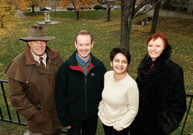Principal’s Prize rewards fab four
Principal’s Prize rewards fab four McGill University
User Tools (skip):
Principal's Prize rewards fab four
Quartet earn kudos from students, faculty, administration

From left to right: Donald Taylor, Brian Lewis, Nilima Nigam, and Donna Lee-Smith, all happy — yet humble — recipients of the 2005 Principal's Prize for Excellence in Teaching.
Owen Egan
Now in its sixth year, the Principal's Prize for Excellence in Teaching recognizes McGill teachers who show "a mastery of the subject matter, a beguiling ability to engage students and a mindfulness of their impact on both the academic achievement and personal successes of students," says Principal Heather Munroe-Blum There's also another trait common to all four 2005 recipients: exceptional humility.
"I was in my office when I received an email from the principal's office, and my first reaction was disbelief," remembers Nilima Nigam, this year's Assistant Professor winner. She has been teaching applied mathematics at McGill since July 2001, and is well known for maintaining a keen interest in her students' academic progress long after they leave her classroom. "There's so many excellent, excellent teachers that I was confounded to hear I was chosen. Pleasantly confounded, but confounded."
Brian Lewis, chair of the Department of History, was in his Leacock office when he learned he had won the Associate Professor prize. It's his second kudo of the year, having won the Noel Fieldhouse Teaching Award this past spring. "My initial reaction was 'How embarrassing!'" he recalls. "How was I going to explain to my colleagues that I wasn't being greedy? So, invoking chair's privilege, I decided not to tell them. Let's hope they don't read the Reporter."
The Principal's Prize process begins with student nominations, which are then collated at the departmental, then the faculty, level. This year's awards were handed out at the October 20 Founder's Day Convocation, when excerpts from student letters of support were read aloud.
Donna-Lee Smith won the Faculty Lecturer prize; she has a cross-appointment as coordinator of the Aboriginal Literacy Program for the Office of First Nations and Inuit Education, and teaches at the Centre for the Study and Teaching of Writing. She recalls standing arm-in-arm with Principal Heather Munroe-Blum on the convocation stage. "[Interim Provost] Tony Masi was reading excerpts from these wonderful letters of support," she says, "and I kept thinking 'Who is he talking about?'" The day was particularly moving for Smith, and not just because it was also her birthday ("Not a bad way to turn 56!"). For fifteen years, she has coordinated the Certificate of Aboriginal Literacy in Education. Several Cree students, with whom she's worked for a decade, travelled from James Bay to receive their bachelor degree in education at the convocation.
"It was a really long process for them to get their degrees," Smith says. "I'm particularly close to this group, and I really admire them. They're very skilled and professional and really care about what they do. I was waiting to give them a hug after they crossed the stage. It was a very moving day."
Donald Taylor agrees, saying he "can't think of anything nicer" than receiving heartfelt accolades from people "who have been subjected to your teaching." Taylor is the recipient of the 2005 Full Professor prize. In addition to teaching large classes on campus (social psychology, inter-group relations), the psychology professor has done a lot of teaching in remote aboriginal communities. He's been at McGill "longer than I'd ever admit," and says the award has a welcome validating effect.
"One of the things that happens as you grow older is you wonder if you can still connect to the students in the same way, with the age gap. If you want to take them from the known to the new, you have to relate to their known, their way of looking at the world. That's not something I worried about when I was a 26 year-old professor at McGill, but it's something I worry about now."
"The prize is also a great motivator," he adds. "It doesn't take the pressure off you, it puts it on you! You can't just cruise! Holy smokes, I have to live up to this!"
For Donna-Lee Smith, winning the prize is "surreal, because there are so many teachers in our faculty who deserve recognition as well."
"It's still difficult for me to explain what the award means to me, but it has given me some assurance that what I do in the classroom works. I love what I do: the rapport with the students, and giving them a comfortable, safe place to learn.
"The trouble is, why what I do in the classroom works is still a mystery!"
The Principal's Prize also carries a $5,000 award, a fact dramatically downplayed by all the recipients — Taylor, for one, only learned about the cash component when he received a tax form at the convocation. Taylor is still thinking about how to spend the windfall, but thinks it will go toward "something that has a permanence." For Nigam, an inveterate reader of fiction, the money will be spent on books. Ms. Smith plans to take her husband to the Azores next summer.
As for Lewis, a man praised for his genuine concern, meticulous preparation, and ability to "put on unparalleled Neville Chamberlain and Winston Churchill accents"?
"I'll spend the money on the mortgage or beer," he quips, "whichever need feels more pressing at the time."

